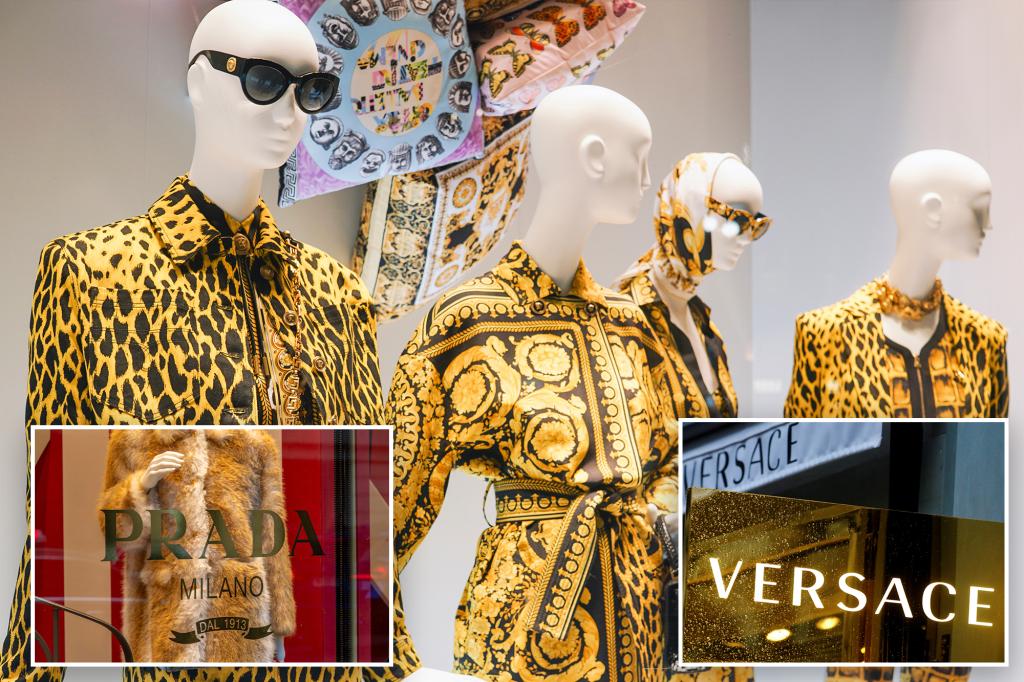The Italian fashion landscape is buzzing with speculation surrounding a potential acquisition of Versace, the iconic luxury brand currently under the ownership of Capri Holdings. Rumors suggest that Prada, another prominent Italian fashion house, is among the interested parties exploring a possible purchase. This development follows the collapse of a proposed merger between Capri and Tapestry, the parent company of Coach, which would have created a formidable American luxury conglomerate. The abandoned deal, valued at $8.5 billion, left Capri open to exploring alternative strategic options, including the sale of Versace and other brands within its portfolio. Capri has reportedly engaged Barclays to advise on these strategic possibilities, with the potential sale of individual brands like Versace and Jimmy Choo, or even the entire Capri Holdings group, being considered.
Prada’s reported interest in Versace marks a significant potential shift in the luxury fashion industry. The two Italian powerhouses represent distinct aesthetic sensibilities, with Versace known for its bold, opulent designs, often featuring the recognizable Medusa motif, while Prada cultivates a more understated, intellectual style, heavily influenced by creative director Miuccia Prada. The potential pairing of these contrasting brands raises questions about the future direction of Versace and how Prada might integrate the brand into its existing portfolio. Sources indicate that Prada is working with Citigroup on the potential acquisition, a relationship established during previous collaborations between the two entities, notably on a dual-listing project that was ultimately shelved. While neither Prada nor Citi has officially commented on the matter, the speculation has fueled interest in the financial markets, with Prada’s shares experiencing a slight dip following the news reports.
Capri Holdings’ decision to explore strategic options, including the potential sale of Versace, comes in the wake of financial challenges. The company recently reported a larger-than-expected decline in quarterly revenue, attributed to both internal execution missteps and a broader slowdown in global demand for luxury goods. Versace, while a prominent brand within Capri’s portfolio, contributed only a fifth of the group’s total revenue in the most recent fiscal year. This performance, coupled with the broader market downturn, likely influenced Capri’s decision to consider divesting some of its holdings. The potential sale of Versace presents an opportunity for Capri to streamline its operations and focus on its remaining brands, while also potentially unlocking significant value for shareholders.
The potential acquisition of Versace by Prada represents a significant development in the luxury fashion industry, with several key factors influencing the situation. Firstly, the failed merger between Capri Holdings and Tapestry significantly altered the strategic landscape, prompting Capri to explore alternative options for its portfolio, including the sale of Versace. Secondly, the declining financial performance of Capri Holdings, driven by both internal challenges and a broader market downturn, has created pressure to restructure and optimize the company’s assets. Thirdly, Prada’s interest in acquiring Versace reflects a broader trend of consolidation within the luxury fashion industry, as brands seek to expand their market share and diversify their offerings.
The potential combination of Prada and Versace raises intriguing questions about the future of both brands. Versace, with its flamboyant and extravagant style, contrasts sharply with Prada’s more understated and intellectual approach. This difference in aesthetic sensibilities creates both opportunities and challenges for a potential integration. Prada might choose to preserve Versace’s distinct identity and leverage its established brand recognition, or it might seek to reposition Versace to align more closely with Prada’s overall aesthetic vision. The success of such a move would depend on carefully balancing the preservation of Versace’s heritage with the potential for modernization and evolution. The luxury fashion market is increasingly competitive, and the ability to adapt and innovate is crucial for long-term success.
Beyond the immediate implications for Prada and Versace, the potential acquisition has broader significance for the luxury fashion industry. The industry is increasingly characterized by consolidation, as larger conglomerates acquire smaller brands to expand their market share and diversify their portfolios. This trend reflects the growing importance of scale and global reach in the luxury market, as brands seek to compete effectively in a rapidly changing environment. The ongoing evolution of consumer preferences, the rise of e-commerce, and the increasing influence of social media are all factors driving change in the luxury fashion landscape. The potential acquisition of Versace by Prada is a reflection of these broader trends and highlights the ongoing dynamics of the luxury fashion industry.


